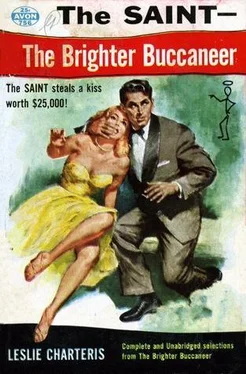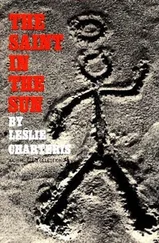Leslie Charteris - The Brighter Buccaneer
Здесь есть возможность читать онлайн «Leslie Charteris - The Brighter Buccaneer» весь текст электронной книги совершенно бесплатно (целиком полную версию без сокращений). В некоторых случаях можно слушать аудио, скачать через торрент в формате fb2 и присутствует краткое содержание. Год выпуска: 1933, Издательство: Doubleday, Жанр: Детектив, на английском языке. Описание произведения, (предисловие) а так же отзывы посетителей доступны на портале библиотеки ЛибКат.
- Название:The Brighter Buccaneer
- Автор:
- Издательство:Doubleday
- Жанр:
- Год:1933
- ISBN:нет данных
- Рейтинг книги:5 / 5. Голосов: 1
-
Избранное:Добавить в избранное
- Отзывы:
-
Ваша оценка:
- 100
- 1
- 2
- 3
- 4
- 5
The Brighter Buccaneer: краткое содержание, описание и аннотация
Предлагаем к чтению аннотацию, описание, краткое содержание или предисловие (зависит от того, что написал сам автор книги «The Brighter Buccaneer»). Если вы не нашли необходимую информацию о книге — напишите в комментариях, мы постараемся отыскать её.
The Brighter Buccaneer — читать онлайн бесплатно полную книгу (весь текст) целиком
Ниже представлен текст книги, разбитый по страницам. Система сохранения места последней прочитанной страницы, позволяет с удобством читать онлайн бесплатно книгу «The Brighter Buccaneer», без необходимости каждый раз заново искать на чём Вы остановились. Поставьте закладку, и сможете в любой момент перейти на страницу, на которой закончили чтение.
Интервал:
Закладка:
The old man's faded eyes blinked at the Saint pitifully. "I don't know anything about things like that. I saw a patent agent's advertisement in a cheap paper, and I took it to him. I gave him all my formulae — everything. That was a fortnight ago. He told me he'd have to make a search of the records before my patent could be taken out. I had a letter from him this morning, and he said that a similar specification had been filed three days ago."
The Saint said nothing; but his blue eyes were suddenly very clear and hard.
"You see what it was?" In his weakness the shabby inventor was almost sobbing. "He swindled me. He gave my specifications to a friend of his and let him file them in his own name. I couldn't believe it. I went to the Patent Office myself this morning: a fellow I found there helped me to find what I wanted. Every figure in the specification was mine. It was my specification. The coincidence couldn't possibly have been so exact, even if somebody else had been working on that same idea at the same time as I was. But I can't prove anything. I haven't a shilling to fight him with. D'you hear? He's ruined me —"
"Steady on, uncle," said the Saint gently. "Have you seen this bird again?"
"I'd just left his office when — when you saw me at Charing Cross," said Inwood shakily. "He threw me out. When he found he couldn't bluff me he didn't bother to deny anything. Told me to go on and prove it, and be careful I didn't give him a chance to sue me for libel. There weren't any witnesses. He could say anything he liked —"
"Will you tell me his name?"
"Parnock."
"Thanks." Simon made a note on the back of an envelope. "Now will you do something else for me?"
"What is it?"
"Promise not to do anything drastic before Tuesday. I'm going away for the week-end, but Parnock won't be able to do anything very villainous either. I may be able to do something for you — I have quite a way with me," said the Saint bashfully.
This was on a Friday — a date that Simon Templar had never been superstitious about. He was on his way to Burnham for a week-end's bumping about in a ten-ton yawl, and the fact that Mr. Inwood's misadventure had made him miss his train was a small fee for the introduction to Mr. Parnock. He caught a later train with plenty of time to spare; but before he left the elderly chemist he obtained an address and telephone number.
He had another surprise the next morning, for he was searching for a certain penny to convince his incredulous host and owner of the yawl about a statement he had made at the breakfast table, and he couldn't find it.
"You must have spent it," said Patricia.
"I know I haven't," said the Saint. "I paid our fares yesterday afternoon out of a pound note; and I bought a magazine for a bob — I didn't spend any pennies."
"What about those drinks at the pub last night?" said the host and owner, who was Monty Hayward.
"We had one round each, at two-and-a-tanner a time. I changed a ten-bob note for my whack."
Monty shrugged.
"I expect you put it in a slot machine to look at rude pictures," he said.
Simon found his bottle and silvered another penny for demonstration purposes. It was left on a shelf in the saloon, and Simon thought no more about it until the following morning. He was looking for a box of matches after breakfast when he came across it; and the sight of it made him scratch his head, for there was not a trace of silver on it.
"Is anyone being funny?" he demanded; and after he had explained himself there was a chorus of denial.
"Well, that's damned odd," said the Saint.
He plated a third penny on the spot, and put it away in his pocket with a piece of paper wrapped round it. He took it out at six o'clock that evening, and the plating had disappeared.
"Would you mind putting me ashore at Southend, Monty?" he said. "I've got some business I must do in London."
He saw Inwood that night; and after the chemist had sniffed at the bottle and tested its remarkable properties he told the Saint certain things which had been omitted from the syllabus of Simon Templar's variegated education. Simon paced the shabby inventor's shabby lodging for nearly an hour afterwards, and went back to his own in a spirit of definite optimism.
At eleven o'clock the next morning he presented himself at Mr. Parnock's office in the Strand. The inscription on the frosted-glass panel of the door informed him that Mr. Parnock's baptismal name was Augustus, and an inspection of Mr. Parnock himself showed that there had been at least one parent with a commendable prescience in the matter of names. Mr. Parnock was so august a personage that it was impossible to think of anyone abbreviating him to "Gus." He was a large and very smooth man, with a smooth convex face and smooth clothes and smooth hair and a smooth voice — except for the voice, he reminded Simon of a well-groomed seal.
"Well, Mr. — er —"
"Smith," said the Saint — he was wearing a brown tweed coat and creaseless grey flannel trousers, and he looked agitated. "Mr. Parnock — I saw your advertisement in the Inventor's Weekly —is it true that you help inventors?"
"I'm always ready to give any assistance I can, Mr. Smith," said Mr. Parnock smoothly. "Won't you sit down?"
The Saint sat down.
"It's like this, Mr. Parnock. I've invented a method of chromium plating in one process — you probably know that at present they have to nickel plate first. And my method's about fifty per cent cheaper than anything they've discovered up to the present. It's done by simple immersion, according to a specified formula." The Saint ruffled his hair nervously. "I know you'll think it's just another of these crazy schemes that you must be turning down every day, but — Look here, will this convince you?"
He produced a letter and handed it across the desk. It bore the heading of one of the largest motor-car manufacturers in the country, and it was signed with the name of the managing director. Mr. Parnock was not to know that among Simon Templar's most valued possessions were a portfolio containing samples of notepaper and envelopes from every important firm in the kingdom, surreptitiously acquired at considerable trouble and expense, and an autograph album in which could be found the signatures of nearly every Captain of Industry in Europe. The letter regretted that Mr. Smith did not consider five thousand pounds a suitable offer for the rights of his invention, and invited him to lunch with the writer on the following Friday in the hope of coming to an agreement.
"You seem to be a very fortunate young man," said Mr. Parnock enviously, returning the document. "I take it that the firm has already tested your discovery?"
"It doesn't need any tests," said the Saint. "I'll show it to you now."
He produced his little brown bottle, and borrowed Mr. Parnock's brass ashtray for the experiment. Before Mr. Parnock's eyes it was silvered all over in a few seconds.
"This bottle of stuff cost about a penny," said the Saint; and Mr. Parnock was amazed.
"I don't wonder you refused five thousand for it, Mr. Smith," he said, as smoothly as he could. "Now, if you had come to me in the first place and allowed me to act as your agent —"
"I want you to do even more than that."
Mr. Parnock's eyebrows moved smoothly upwards for about an eighth of an inch.
"Between ourselves," said the Saint bluntly, "I'm in the hell of a mess."
The faintest gleam of expression flitted across Mr. Parnock's smooth and fish-like eyes, and gave way to a gaze of expectant sympathy.
"Anything you wanted to tell me, Mr. Smith, would of course be treated confidentially."
"I've been gambling — living beyond my means — doing all sorts of silly things. You can see for yourself that I'm pretty young. I suppose I ought to have known better… I've stopped all that now, but — two months ago I tried to get out of the mess. I gave a dud cheque. I tried to stay in hiding — I was working on this invention, and I knew I'd be able to pay everyone when I'd got it finished. But they found me last Friday. They've been pretty decent, in a way. They gave me till Wednesday noon to find the money. Otherwise —"
Читать дальшеИнтервал:
Закладка:
Похожие книги на «The Brighter Buccaneer»
Представляем Вашему вниманию похожие книги на «The Brighter Buccaneer» списком для выбора. Мы отобрали схожую по названию и смыслу литературу в надежде предоставить читателям больше вариантов отыскать новые, интересные, ещё непрочитанные произведения.
Обсуждение, отзывы о книге «The Brighter Buccaneer» и просто собственные мнения читателей. Оставьте ваши комментарии, напишите, что Вы думаете о произведении, его смысле или главных героях. Укажите что конкретно понравилось, а что нет, и почему Вы так считаете.












